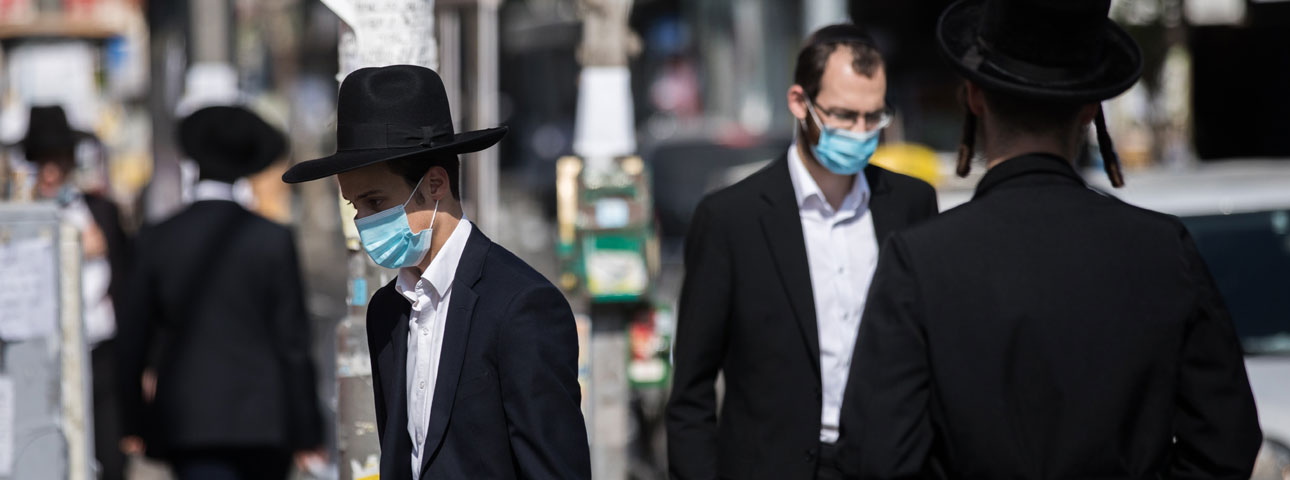Haredim Trust Rabbis More Than the Health Ministry on COVID-19
A special survey by the Guttman Center for Public Opinion and Policy Research at the Israel Democracy Institute examined opinions among the ultra-Orthodox (Haredi) community about aspects pertaining to the coronavirus pandemic focusing on trust in leadership, state institutions and relationships with other Israelis.

The survey revealed that notwithstanding the understanding of the dangers of spreading coronavirus, members of the ultra-Orthodox community have very low levels of trust in the state institutions' management of the crisis, faith in their Rabbinical leadership is high. Despite this mistrust in government agencies, the majority of Haredim say they follow the Ministry of Health’s guidelines.
Survey Highlights
Rabbinical leadership – throughout the ultra-Orthodox community, levels of confidence in rabbinic leadership is very high (90%) with large percentages saying they want their rabbis to be involved in setting policy for dealing with the coronavirus. 93% think it is necessary or absolutely necessary to include rabbis when setting policy on how to deal with the coronavirus.
61% rely on rabbis the most for evaluating the risk posed by COVID-19 (72% among the Hassidim, 58% among the non-Hassidim and Sephardim).
Rely on the most for evaluating the risk posed by COVID-19 (entire sample, %)
| Rabbis | 61.4 |
| Medical experts | 22 |
| God | 4.5 |
| The prime minister and his advisors | 2.6 |
| None of them/only myself | 2.1 |
| Rabbis and medical experts | 2 |
| Other | 1.9 |
| The local authority | 1.8 |
| Don’t know | 1.1 |
| Ultra-Orthodox politicians | 0.6 |
Torah Studies – when the second wave of the pandemic hit Israel, 67% of the ultra-Orthodox thought it was essential to continue the Torah studies in the Yeshivot (high schools and seminaries) and Talmudei Torah (elementary schools) and only 16% thought it was essential to suspend them. 17% answered they don’t know.
Trust in Institutions – the survey revealed that the ultra-Orthodox have very little or no confidence in the state institutions in charge of handling the public efforts to mitigate coronavirus. The majority answered they have little or no faith in the police (86.5%), the Health Ministry (75%), in the Finance Ministry (65%), and Prime Minister Netanyahu (62%), in the IDF and HFC (44%). Only 7% said they had little or no confidence in their rabbinical leadership.
Have little or no confidence in the professionals and agencies leading the campaign against the coronavirus (entire sample, %)
What guides decision makers – 60% think that mostly, or only, political considerations guided the decision makers in their efforts against the coronavirus - 30% think that mainly health related concerns and only 4% think that only health related concerns guided their decisions. 6% answered they don’t know.
What considerations do you think guided the decision-makers in their campaign against the coronavirus? (entire sample, %)
81% of ultra-Orthodox think that the fact that the Haredim were not allowed to hold services in synagogues while protest and demonstrations were allowed is proof that there is discrimination against the ultra-Orthodox community in Israel. 16% don’t agree much or totally disagree and 3% don’t know.
Ultra-Orthodox politicians – 52% think they did a good job of protecting their constituency against the decisions that harmed it, 40% do not and 8% don’t know.
Fear the Coronavirus – 78% think that the coronavirus poses a mortal danger, 69% believe or strongly believe the claim that the COVID-19 has long term health effects and only 24% believe or strongly believe that intentional infection is a way to produce herd immunization that would protect the entire population against the virus. Nevertheless, less than half (47%) are afraid that they or a family member will contract the disease.
What is the cause of infection? 58% of the ultra-Orthodox think that the main cause of the high infection and morbidity rates among the ultra-Orthodox is the crowded housing situation in the ultra-Orthodox localities. 12% think that the cause is the lack of consideration for the ultra-Orthodox way of life by those who issued the instructions and 8% think the government didn’t transmit the appropriate information to the ultra-Orthodox community. Only 2% think the cause was the rabbi’s instructions to continue normal life or lack of enforcement of the directives.
According to Health Ministry data, the infection and morbidity rates in the ultra-Orthodox sector are very high. What do you think is the main cause of these high infection and morbidity rates? (entire sample, %)
Following government directives – Notwithstanding the low levels of confidence in the Ministry of Health, 82% of the ultra-Orthodox say that they follow to a great extent or to a very great extent the Ministry of Health’s directives for protecting themselves from the virus, 14% to a slight extent and 4% not at all.
Relations between the ultra-Orthodox and other Israelis – 90.5% of ultra-Orthodox think that the coronavirus damaged or greatly damaged the relations with other Israelis. 3.5% think that it improved or greatly improved them and 6% don’t know.
The survey about the ultra-Orthodox and the coronavirus pandemic was conducted by the Guttman Center for Public Opinion Research and Policy at the Israel Democracy Institute. The telephone poll in Hebrew of 860 men and women, a nationwide representative sample of the entire adult ultra-Orthodox population of Israel, age 18 and up. The maximum sampling error for the entire sample is 3.4%±, with a confidence level of 95%. The full data file is available at Data Israel.
